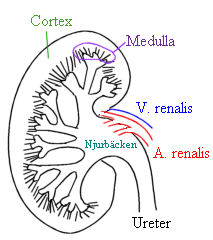Groningen: Patients who eat a low-potassium
diet after a kidney transplantation have a higher risk of losing
function of the donated kidney and dying prematurely. These are the
conclusions of researchers from the department of Nephrology/Internal
Medicine at the UMCG. The results of their research are today published
in The American Journal of Clinical Nutrition.
In the Netherlands, approximately 1,000 people per year undergo a kidney transplant after their own kidneys stop functioning satisfactorily. One of the main threats that patients face who receive a donated kidney is transplant failure, which means that the functioning of the donor organ deteriorates to an extent that the patient needs a new transplant or dialysis.
Preventing cardiac arrest
Many patients are prescribed a low-potassium diet in the period preceding a kidney transplant to reduce the risk of cardiac arrest resulting from high potassium levels in the blood. Poor kidney function makes the body unable to discharge large quantities of potassium in the urine. Patients are therefore advised to avoid high-potassium containing foods such as vegetables, fruit, milk and legumes.
Suspecting that many patients continued to follow this low-potassium diet after transplantation, the researchers studied the potassium intake of a group of more than 700 kidney transplant patients and compared this with a healthy control group. The results confirmed that these patients tended to consume less potassium than the healthy group. According to the researchers, this is partly because of the routine they have developed, and partly because they remain anxious about eating too much potassium. The research also revealed a link between low potassium intake in kidney transplant patients and a significantly higher long-term risk of transplant failure and even premature death.
More research needed
‘We investigated several mechanisms that we thought may account for our findings, such as increased production of ammonia by the kidney, higher blood pressure and lower potassium levels in the blood, but none of them explained the negative impact of a low-potassium diet after transplantation. We need more research into the mechanism controlling the association we found’, says Michele Eisenga, UMCG researcher and first author of the publication.
In the meantime, it is important that kidney transplant patients and their healthcare providers realize that after a transplantation, the situation regarding diet changes. This research suggests that eating food that contains potassium after kidney transplantation will improve the long-term prospects for kidney transplant patients.
Read the article in The American Journal of Clinical Nutrition here:
http://ajcn.nutrition.org/content/early/2016/11/09/ajcn.116.134056.full.pdf
Source: news release UMCG
In the Netherlands, approximately 1,000 people per year undergo a kidney transplant after their own kidneys stop functioning satisfactorily. One of the main threats that patients face who receive a donated kidney is transplant failure, which means that the functioning of the donor organ deteriorates to an extent that the patient needs a new transplant or dialysis.
Preventing cardiac arrest
Many patients are prescribed a low-potassium diet in the period preceding a kidney transplant to reduce the risk of cardiac arrest resulting from high potassium levels in the blood. Poor kidney function makes the body unable to discharge large quantities of potassium in the urine. Patients are therefore advised to avoid high-potassium containing foods such as vegetables, fruit, milk and legumes.
Suspecting that many patients continued to follow this low-potassium diet after transplantation, the researchers studied the potassium intake of a group of more than 700 kidney transplant patients and compared this with a healthy control group. The results confirmed that these patients tended to consume less potassium than the healthy group. According to the researchers, this is partly because of the routine they have developed, and partly because they remain anxious about eating too much potassium. The research also revealed a link between low potassium intake in kidney transplant patients and a significantly higher long-term risk of transplant failure and even premature death.
More research needed
‘We investigated several mechanisms that we thought may account for our findings, such as increased production of ammonia by the kidney, higher blood pressure and lower potassium levels in the blood, but none of them explained the negative impact of a low-potassium diet after transplantation. We need more research into the mechanism controlling the association we found’, says Michele Eisenga, UMCG researcher and first author of the publication.
In the meantime, it is important that kidney transplant patients and their healthcare providers realize that after a transplantation, the situation regarding diet changes. This research suggests that eating food that contains potassium after kidney transplantation will improve the long-term prospects for kidney transplant patients.
Read the article in The American Journal of Clinical Nutrition here:
http://ajcn.nutrition.org/content/early/2016/11/09/ajcn.116.134056.full.pdf
Source: news release UMCG
